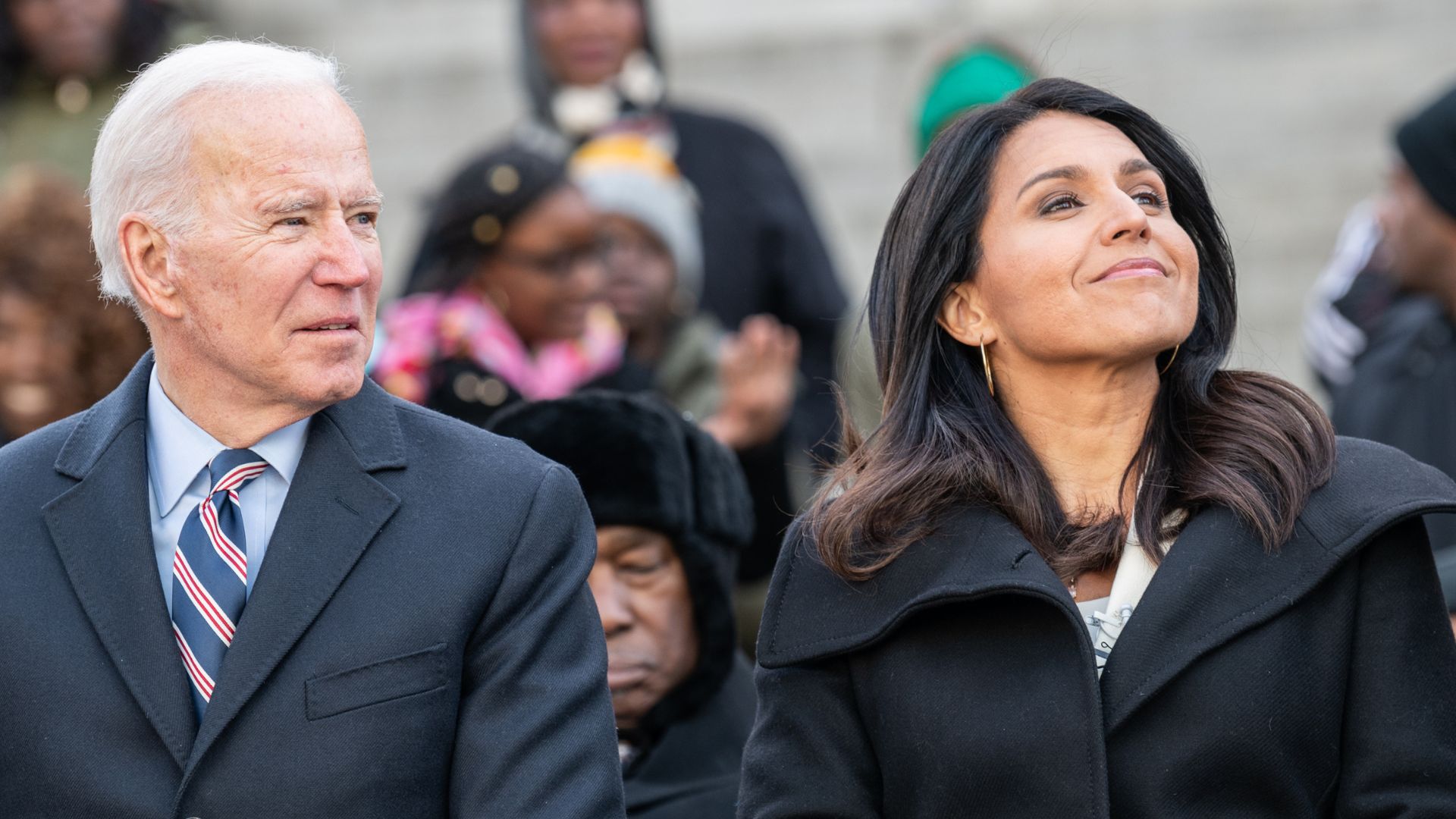
Director of National Intelligence Tulsi Gabbard on Thursday declassified key sections of the Biden-Harris administration’s “Strategic Implementation Plan for Countering Domestic Terrorism,” a document that outlines a four-part strategy used over the last four years to label and monitor political dissent under the framework of domestic terrorism.
Gabbard stated, “As promised, I have declassified the Biden Administration’s Strategic Implementation Plan for Countering Domestic Terrorism,” making the controversial internal playbook available to the public.
As promised, I have declassified the Biden Administration’s Strategic Implementation Plan for Countering Domestic Terrorism.
Read it here: https://t.co/VAXDHkgZTK https://t.co/oNXjKDqamc pic.twitter.com/p9co00Scge
— DNI Tulsi Gabbard (@DNIGabbard) April 16, 2025
Trump’s Sovereign Wealth Fund: What Could It Mean For Your Money?
Senator Eric Schmitt (R-MO), who previously served as Missouri’s attorney general, released an in-depth summary of the declassified materials on his X account, calling the plan “a roadmap for left-wing ideological warfare.”
In June 2021, the Biden admin released its public strategy for “countering domestic terrorism.”
In a lawsuit, @America1stLegal discovered that there was a separate, classified version of that plan.
But the private version wasn’t public—until now.https://t.co/eQ6fJtwaGZ
— Eric Schmitt (@Eric_Schmitt) April 17, 2025
This Could Be the Most Important Video Gun Owners Watch All Year
“This was written in the early months of the Biden presidency,” Schmitt posted.
“But it lays out, in detail, exactly what they would go on to do—and how they justified it.”
What’s remarkable about the document is that it’s an explicitly ideological vision. Its scope extends far beyond criminal violence—it encompasses online speech, education, gun control, even election participation.
It’s a strategy to suppress not just individuals, but IDEAS. pic.twitter.com/pHt7f1CjkZ
— Eric Schmitt (@Eric_Schmitt) April 17, 2025
Schmitt explained that by classifying political dissent as “domestic terrorism,” the administration “could effectively treat their critics as enemies of the state.”
The American Civil Liberties Union (ACLU), a group generally aligned with liberal causes, had previously expressed concern over the implications of the strategy.
The declassified document outlines four central pillars of the administration’s domestic terrorism plan:
- Understand and Share DT-Related Information
- Prevent DT Recruitment and Mobilization to Violence
- Disrupt and Deter DT Activity
- Confront Long-Term Contributors to DT
Schmitt said the first pillar allowed for sweeping information-sharing across agencies, enabling “every arm of the government” to monitor American citizens.
He linked this approach to controversial incidents in which parents speaking at school board meetings were reportedly labeled as domestic threats.
The second pillar addressed efforts to prevent so-called recruitment and mobilization.
According to Schmitt, this is where the Biden-Harris administration coordinated with third-party entities—including social media companies, non-governmental organizations (NGOs), and advocacy groups—to restrict speech and suppress opposition viewpoints online.
One example of this, Schmitt noted, occurred in 2021 when the Anti-Defamation League (ADL) pushed advertisers to pull support from Tucker Carlson’s Fox News program.
The Biden-Harris administration’s frequent collaboration with Big Tech platforms to suppress dissenting views on topics ranging from COVID-19 policy to election integrity has drawn ongoing scrutiny.
The third pillar elevated domestic terrorism as a top national security focus, directing federal agencies like the FBI to prioritize investigations.
This included cases where federal agents executed unannounced raids at the homes of pro-life advocates, incidents that have drawn widespread criticism from civil liberties groups and conservative lawmakers.
The fourth and final pillar aimed at addressing perceived root causes of extremism by embedding left-leaning priorities into federal education and law enforcement policy.
The strategy included recommendations to expand funding for civics education programs that promote “action civics,” a term critics associate with left-wing activism in schools.
“It calls for funding ‘civics education’ to teach ‘action civics’ (read: left-wing activism) and wielding law enforcement to ‘mitigate xenophobia and bias’ in COVID policy,” Schmitt said in his review of the documents.
Finally, as you can see above, it calls for a ban on “assault weapons and high-capacity magazines.”
Once again, this was a preview of how they would operate—the Biden admin regularly used the specter of “domestic terror” as a pretext to push for crackdowns on gun rights. pic.twitter.com/mHzulFfeY9
— Eric Schmitt (@Eric_Schmitt) April 17, 2025
Schmitt concluded his analysis by warning that no administration—regardless of party—should ever again be allowed to wield the federal government in such a manner.
But the private, internal one is worse. It’s specific, direct, and doesn’t hide behind vague, sweeping generalities.
When read in light of everything the Biden administration went on to do, their overarching goals are crystal clear.
We can never let this happen again. End 🧵
— Eric Schmitt (@Eric_Schmitt) April 17, 2025
The declassification of the document arrives just months after President Trump signed new directives aimed at dismantling federal censorship partnerships and restoring constitutional protections for political speech.
Congressional committees are now expected to review the plan in detail as part of broader investigations into domestic surveillance and free speech violations.
Gabbard’s release of the material fulfills a promise made earlier this year to increase transparency in intelligence operations and restore public trust in federal agencies.
Connect with Vetted Off-Duty Cops to Instantly Fulfill Your Security Needs


![NYC Tourist Helicopter Falls into Hudson River, Siemens Executive and Family Among Those Killed [WATCH]](https://www.right2024.com/wp-content/uploads/2025/04/NYC-Tourist-Helicopter-Falls-into-Hudson-River-Siemens-Executive-and-350x250.jpg)






![Red Sox Fan Makes the ‘Catch of the Day’ with Unconventional ‘Glove’ [WATCH]](https://www.right2024.com/wp-content/uploads/2025/04/Red-Sox-Fan-Makes-the-‘Catch-of-the-Day-with-350x250.jpg)
![Green Day’s Cringe Trump Diss Ends in Fire and Evacuation [WATCH]](https://www.right2024.com/wp-content/uploads/2025/04/Green-Days-Cringe-Trump-Diss-Ends-in-Fire-and-Evacuation-350x250.jpg)






